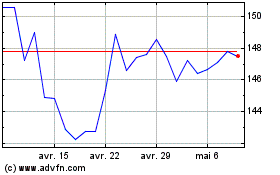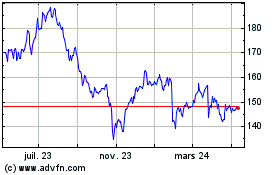Today's Logistics Report: 'Tis Delivery Season; Nimble Warehousing; Braking Trucking's Rest Rules
24 Décembre 2018 - 7:44PM
Dow Jones News
By Paul Page
Sign up: With one click, get this newsletter delivered to your
inbox.
Retailers and parcel carriers are delivering strong results
along with signals of steep changes in sales and shipping patterns
this holiday season. Early measures suggest stores met lofty sales
expectations, the WSJ's Sarah Nassauer and Paul Ziobro report, as
Americans crowded stores and retailers wrapped up one of the
strongest holiday seasons in years. U.S. retail sales rose 5.2%
from Nov. 1 to Dec. 19, and Mastercard SpendingPulse says online
sales rose 18.3% during that time and accounted for a record 13% of
total sales. In-store sales grew 4.3%. The delivery backbone of the
online economy has held up, with ShipMatrix Inc. reporting on-time
performance at FedEx Corp. and the U.S. Postal Service was on track
with last year while United Parcel Service Inc. improved its
deliveries thanks to extra capacity and new technology. Those
efforts suggest carriers have new lessons from this season to take
into 2019.
More retailers are turning toward flexibility over fixed assets
when it comes to warehousing. The companies and their logistics
providers are taking a cue from gig-economy principles by turning
to on-demand distribution capacity, the WSJ Logistics Report's
Jennifer Smith writes, as they look to stay nimble while digital
commerce raises the stakes in supply chains. The idea is to tap
into unused warehouse space in a crowded U.S. real-estate market
where capacity near population centers fetches a growing price
premium. Online startup retailers have been prime targets for such
pop-up spots, but they're now attracting big retailers trying to
set logistics strategies in the face of volatile demand. Walmart
Inc., for instance, used the Flexe Inc. marketplace to get some 1.5
million square feet of temporary space for e-commerce fulfillment
this season. Logistics providers are noticing, and establishing
their own on-demand warehouse services.
Federal highway safety regulators delivered an interstate
victory to trucking companies. A new U.S. Transportation Department
ruling effectively runs California's attempts to its own rules for
trucker rest breaks off the road. The WSJ Logistics Report's Erica
E. Phillips writes the ruling in response to a petition from the
American Trucking Associations says the state rules "cause an
unreasonable burden on interstate commerce," and are preempted by
the federal hours-of-service regulations. That's a win for trucking
companies in a long-running battle over California's efforts to
impose rules that are tougher than federal restrictions in various
areas of transportation. California lawmakers recently passed
legislation toughening rules on port trucking by making shipping
customers partly responsible for labor-law violations. Trucking
groups have mobilized against the rules on meals and rest breaks,
but they haven't been able to get Congress to act to clarify that
federal rules preempt California's standards.
SUPPLY CHAIN STRATEGIES
A Pennsylvania woolen mill that helped weave the fabric of
American history for nearly two centuries is spinning its final
chapter. The Woolrich mill in Woolrich, Penn., is succumbing to the
driving forces of global business and shutting down after more than
170 years of operation, the WSJ's Ruth Simon reports, idling a
plant that fashioned blankets for Union soldiers as well as the
flannel shirts that have clothed 21st century youth. The shutdown
this year comes as bigger events around the world roiled the
business, highlighting the broad forces that are transforming U.S.
manufacturing. But some descendants of Woolrich's founder who ceded
control of the business also believe it unraveled because of the
lack of investment over the years. That helped leave Woolrich in
the hands of a private-equity owner who will keep the business name
intact but shutter a factory now deemed too costly to operate.
QUOTABLE
IN OTHER NEWS
The pace of U.S. economic output growth was revised down
slightly to 3.4% in the third quarter. (WSJ)
A gauge of U.S. business investment in capital goods fell 0.6%
from October to November. (WSJ)
Household spending in the U.S. increased in November for the
ninth straight month. (WSJ)
A measure of U.S. consumer confidence rose in December.
(WSJ)
U.S. inflation slowed sharply in November after a short-lived
pickup the previous month. (WSJ)
Canadian firms are maintaining plans to increase their
investment in machinery and equipment. (WSJ)
U.K. police released without charge two suspects held for
disruptions caused by drones at London Gatwick Airport. (WSJ)
Gasoline production and supplies are soaring even though prices
have fallen to the lowest level since August 2017. (WSJ)
JD.com founder Liu Qiangdong is facing strong criticism in China
even though U.S. prosecutors declined to charge him in a
sexual-assault investigation. (WSJ)
Dutch chemicals company Nouryon BV plans to continue raising
prices to offset rising raw materials costs. (WSJ)
Foxconn Technology Group is preparing to launch a $9 billion
chip-making project in China. (Nikkei Asian Review)
Grocery stores have gained a bigger share of online sales with
services like curbside pickup and home delivery. (Supermarket
News)
Danish electronics supplier Bang & Olufsen says troubles
bringing in a new logistics provider will cut into its profits.
(Logistics Manager)
New York's City Council approved zoning and other changes aimed
at restoring apparel production in the city. (Sourcing Journal)
Federal authorities set the maximum $12,934 fine on XPO
Logistics Inc. for a warehouse accident in Lockport, N.Y., that
killed two workers. (Buffalo News)
Several northeastern states agreed to develop a cap-and-trade
system to cut transport-sector carbon emissions. (Fleet Owner)
Daimler Trucks North America delivered its first electric
Freightliner truck to Penske Truck Leasing. (Commercial Carrier
Journal)
Europe and Asia-Pacific maritime authorities will issue warnings
to vessels that appear unprepared to comply with impending
sulfur-emissions restrictions. (Lloyd's List)
Ports America will invest $66.5 million under a 50-year lease to
operate a Port of New Orleans container terminal. (American
Shipper)
Germany's Port of Hamburg will start deepening and widening the
River Elbe next year. (Seatrade Maritime)
Macquarie is nearing a sale of Poland's DCT Gdansk terminal to a
group of investors including Poland's sovereign wealth fund.
(Reuters)
An auditor's report says Kenya could lose control of the Port of
Mombasa if it defaults on infrastructure loans from China.
(Maritime Executive)
Canadian National Railway Ltd. reached a tentative contract
agreement with the union representing track and bridge workers.
(Progressive Railroading)
Airfreight volume at Germany's cargo-focused Frankfurt-Hahn
Airport rose 58.4% in the first 10 months of 2018. (Air Cargo
News)
China's CRRC Corp. completed the first subway cars at its
Massachusetts assembly plant. (Springfield Republic)
ABOUT US
Paul Page is deputy editor of WSJ Logistics Report. Follow him
at @PaulPage, and follow the entire WSJ Logistics Report team:
@CostasParis, @jensmithWSJ and @EEPhillips_WSJ. Follow the WSJ
Logistics Report on Twitter at @WSJLogistics.
(END) Dow Jones Newswires
December 24, 2018 13:29 ET (18:29 GMT)
Copyright (c) 2018 Dow Jones & Company, Inc.
United Parcel Service (NYSE:UPS)
Graphique Historique de l'Action
De Sept 2024 à Oct 2024

United Parcel Service (NYSE:UPS)
Graphique Historique de l'Action
De Oct 2023 à Oct 2024
